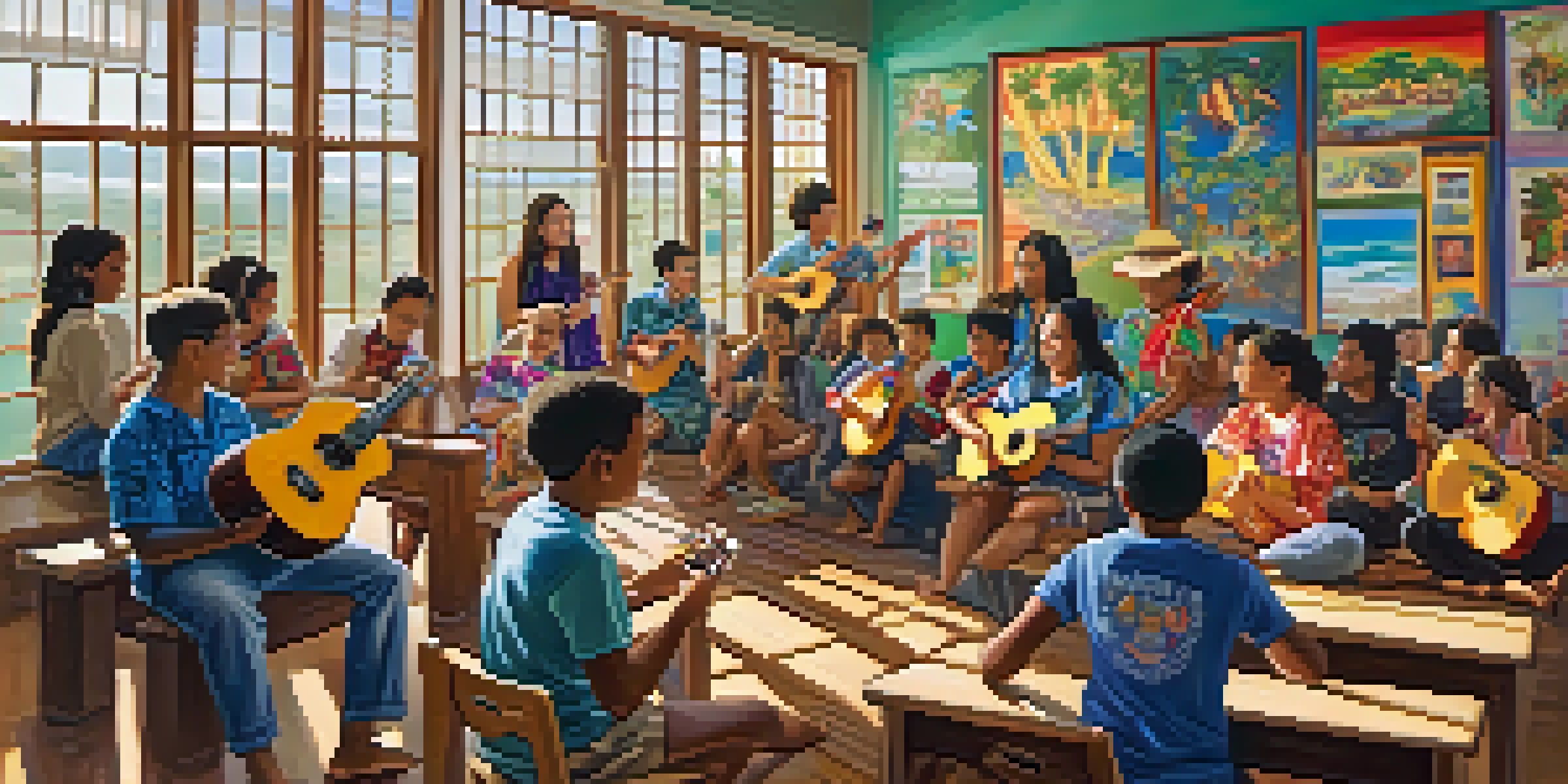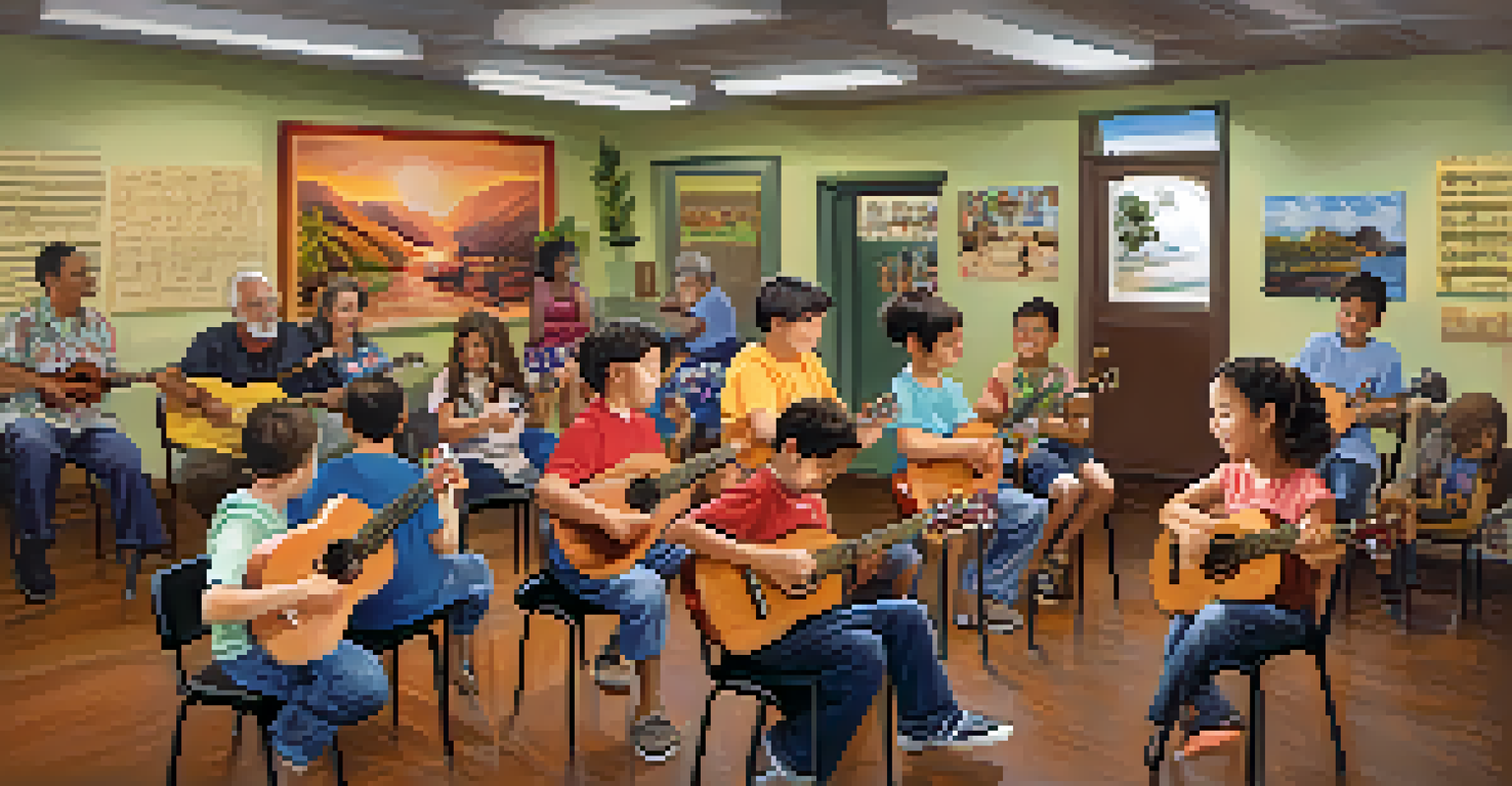A Brief History of Ukulele Music in Hawaiian Education

The Origins of the Ukulele in Hawaii's Music Scene
The ukulele, a small, guitar-like instrument, made its way to Hawaii in the late 19th century. Originally brought by Portuguese immigrants, it quickly became a staple in Hawaiian music. Its cheerful sound and portability made it a favorite among locals, contributing to the vibrant cultural tapestry of the islands.
Music can change the world because it can change people.
As Hawaiian music began to flourish, the ukulele evolved, incorporating various musical styles and influences. It became synonymous with the islands' identity, resonating with both residents and visitors alike. The instrument's popularity set the stage for its inclusion in educational settings.
By the early 20th century, schools across Hawaii began to recognize the ukulele's potential as a teaching tool. It not only provided a means for students to express themselves musically but also fostered a sense of community and cultural pride.
Ukulele as a Tool for Cultural Education
In Hawaiian schools, the ukulele serves as more than just an instrument; it's a gateway to understanding Hawaiian history and culture. Through playing, students learn about traditional songs, dances, and stories that are integral to their heritage. This hands-on approach makes learning engaging and relatable.

Teachers often incorporate ukulele lessons into the curriculum to promote cultural identity among students. By learning to play Hawaiian songs, students develop a deeper appreciation for their roots and the significance of music in their community. This connection to culture is vital for preserving Hawaiian traditions.
Ukulele Enhances Cultural Education
In Hawaiian schools, the ukulele serves as a vital tool for teaching students about their history and cultural heritage.
Moreover, the ukulele encourages collaboration and teamwork among students. Group lessons and performances create a sense of belonging, allowing students to bond over shared experiences while celebrating their cultural heritage.
The Role of Ukulele in Music Education Programs
Ukulele programs in Hawaiian schools have gained traction over the years, often being introduced alongside traditional music education. Its simplicity makes it an accessible instrument for students of all ages, fostering a love for music from a young age. This accessibility opens doors for students who might not have had the chance to engage with music otherwise.
The ukulele is a perfect instrument for sharing music and culture because of its simplicity and joyfulness.
In many programs, students learn not just how to play the ukulele but also about music theory and composition. This comprehensive approach helps them develop a well-rounded musical skill set. The ukulele's versatility enables students to explore various genres, enhancing their creativity and expression.
With the rise of online resources and social media, ukulele education has expanded beyond the classroom. Students can now access tutorials and connect with other ukulele enthusiasts, further enriching their learning experience and encouraging a global appreciation for this beloved instrument.
The Influence of Hawaiian Music Festivals
Hawaiian music festivals have played a significant role in popularizing the ukulele, both locally and globally. Events like the ‘Ukulele Festival Hawaii showcase talented musicians and inspire students to pursue their musical passions. These festivals create a vibrant atmosphere where the community comes together to celebrate music and culture.
Through workshops and performances at these festivals, students can learn directly from experienced musicians. This exposure not only enhances their skills but also motivates them to continue exploring the ukulele. The festivals serve as a reminder of the instrument's rich history and its importance in Hawaiian culture.
Community Boosts Ukulele Programs
Local organizations and businesses play a crucial role in supporting ukulele education by providing resources and fostering community engagement.
Additionally, these events allow students to showcase their talents, boosting their confidence and encouraging them to embrace their musical journey. The sense of accomplishment from performing in front of an audience can be life-changing for young musicians.
Community Support for Ukulele Education
Community organizations and local businesses have been instrumental in supporting ukulele education in Hawaii. Many provide funding, instruments, or resources to schools, ensuring that students have access to quality music education. This support fosters a love for music and encourages students to engage with their cultural heritage.
Workshops and ukulele clubs often emerge within communities, offering additional opportunities for students to learn and connect. These gatherings create a supportive environment where students can share their progress, collaborate on projects, and inspire one another. Such community involvement is vital for nurturing young talent.
Moreover, these initiatives help bridge the gap between generations. Older musicians often mentor younger players, passing down knowledge and skills while strengthening community ties. This intergenerational exchange enriches the learning experience and ensures the continuity of Hawaiian musical traditions.
Challenges Facing Ukulele Music Education
Despite its popularity, ukulele music education in Hawaii faces challenges, including funding and resource allocation. Schools may struggle to maintain music programs due to budget cuts, limiting students' access to instruments and instruction. This is a significant concern as it impacts the future of music education in the islands.
Additionally, the demand for skilled ukulele instructors can outpace availability, making it difficult for schools to find qualified teachers. Without proper guidance, students may not receive the full benefits of music education. This gap could hinder the growth of future musicians and the preservation of Hawaiian music.
Future of Ukulele Education is Bright
With increasing interest and innovative teaching methods, ukulele music education in Hawaii is poised for growth and cultural preservation.
Creative solutions, such as partnerships with local musicians and online learning platforms, are emerging to address these challenges. By leveraging community resources and technology, educators can continue to provide quality ukulele education and ensure that students remain connected to their musical heritage.
The Future of Ukulele in Hawaiian Education
Looking ahead, the future of ukulele music education in Hawaii appears promising. With a growing interest in music and cultural preservation, more schools are incorporating ukulele programs into their curricula. This trend reflects a broader appreciation for the arts and the significance of cultural education.
Innovative teaching methods and technology integration are enhancing the learning experience. Virtual classes, online resources, and interactive platforms are making ukulele education more accessible to students across the islands. This adaptability ensures that the spirit of Hawaiian music continues to thrive.

Furthermore, as more students embrace the ukulele, there's potential for new genres and styles to emerge. The instrument's versatility allows for experimentation and collaboration, paving the way for exciting musical developments. The future of ukulele music in Hawaiian education is not just about preservation; it's about innovation and growth.